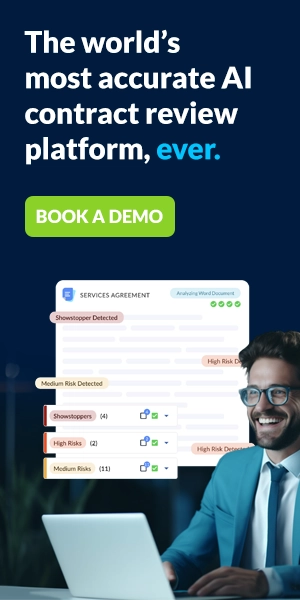Artificial Intelligence is no longer a ‘speculative technology’ in legal operations. Organisations from law firms to in-house departments are increasingly leveraging AI to improve speed, consistency and insight across contracting and legal workflows. Yet readiness matters, AI should enhance professionalism, not disrupt it. At ThoughtRiver, we believe that sophisticated use of AI amplifies accuracy, supports excellence, and strengthens legal governance. Here are five signs your legal team is truly ready to adopt AI with integrity and precision.
1. You Are Spending Excessive Time on Repetitive Contract Review
One of the most tangible early signs of readiness is when lawyers are repeatedly engaged in manual review of contracts that follow predictable patterns, such as with NDAs, renewal contracts, standard service agreements and compliance templates. When a significant part of your team’s day is consumed by routine review, productivity suffers and risk increases.
AI-augmented contract review has been shown to cut review times drastically — legal functions using AI can spend up to 80% less time reviewing each contract than with traditional methods.
This frees lawyers to focus on negotiation strategy, risk profiling, and business-critical work where legal judgment really matters.
2. You Have Well-Defined Policies or Playbooks That Are Hard to Enforce Consistently
Many legal teams have developed internal playbooks, documented guidance on preferred language, risk thresholds, fallback positions and escalation rules. However, if those standards remain siloed in PDFs, Word documents, or disparate spreadsheets, their use will fluctuate with individual reviewer experience.
AI-driven tools operationalise playbooks by:
- Embedding rules directly into review workflows
- Automatically flagging deviations
- Reducing inconsistency across reviewers
- Creating more consistent drafting options
- Shortening onboarding time for new team members
When policy language lives in your tooling and not just in shared drives, your organisation is ready for AI that amplifies best practice rather than replaces it.
3. Business Stakeholders Are Asking for Faster Turnaround Without Compromising Risk
Legal teams increasingly hear from Sales, Procurement and HR that slow contract cycles hinder business agility. Once this tension shifts from anecdote to recurring pattern, stakeholders seeking expedited agreements alongside assurances of compliance, it highlights readiness for technology that can enable controlled self-service and enforce governance automatically.
The most advanced AI solutions can provide business users with an interface that:
- Pre-validates templates
- Highlights areas requiring legal input
- Routes complex cases to specialists
- Maintains full audit trails
This approach drives speed and accountability.
4. Your Leadership Is Asking for Risk Intelligence, Not Just Activity Metrics
Traditional contract tracking tells you how many contracts are signed and when. Leading legal teams want to understand why deviations occur, where the recurring risk patterns lie, and how contractual terms impact commercial performance.
AI can extract and classify clause-level data across thousands of agreements, turning your repository into actionable risk intelligence. Instead of just reporting on volume and cycle time, you can report on trends such as:
- Frequency of non-standard terms
- Risky confidentiality or IP, or other clauses
- Jurisdictional differences that may require unique terms
- Portfolio-wide variance from approved positions
Where business leadership is demanding data insights, not just status updates, your team is ready for AI-powered analytics.
5. Your Culture Values Innovation, Diligence, and Rigorous Adoption Practices
Technology alone does not guarantee success. Teams that thrive with AI demonstrate:
- A willingness to pilot intelligently
- A commitment to training and upskilling
- A mindset that views AI as augmentation, not automation without supervision
- A focus on governance, accuracy and ethical deployment
Recent industry research shows that many legal professionals recognise AI’s future impact, with 80% agreeing that AI will have a transformational effect on their work over the next five years.
But readiness is behavioural as much as technological. A mature team tests without fear, documents outcomes carefully, and emphasises ongoing evaluation. That commitment to thoughtful adoption is what separates superficial experimentation from genuine transformation.
Why These Signals Matter - A Sophisticated Perspective
Across the legal industry, adoption of AI is uneven. Larger firms and departments often lead in experimentation, while smaller operations proceed more cautiously. For instance, surveys suggest that 75% of the UK’s largest law firms are using AI, compared to only 30% of small firms exploring it. Law Society
This reflects an important reality: readiness varies by organisation, size, culture and strategic priorities. The teams best positioned to benefit from AI are not those that chase technology trends, but those that align AI with governance, risk management and legal strategy.
Next Steps for Legal Teams Considering AI
If your team resonates with multiple signs above, you are likely well positioned to pilot legal AI with impact and integrity. Key next steps can include:
- Adopting a mindset of experimentation and innovation
- Defining clear objectives for the first use case (e.g., NDA review, playbook enforcement, contracting analytics)
- Engaging requisite stakeholders across Legal Operations, IT and risk to align governance
- Evaluating solutions that embed policy logic and deliver explainable outputs
- Establishing training and change-management plans
ThoughtRiver’s platform is designed to operationalise playbooks, automate review where appropriate, and integrate risk insight directly into workflows, all while maintaining the highest standards of accuracy and professional integrity.


